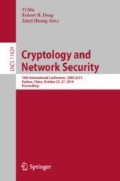Abstract
Accountable assertion enables a payer to make off-chain payments to a payee, and at the same time, the payer’s secret credentials can be revealed if she equivocates (i.e., makes conflicting statements to others). In this paper, we introduce a new construction of accountable assertion that allows an assertion to be accountable for k times. We also present a new construction of anonymous payment channels for the cryptocurrency Bitcoin that allows a payer with k-time accountable assertions to anonymously make off-chain payments to the payee. In particular, we define formal security models for the new constructions, we also prove that the k-time assertion can achieve strong secrecy, and the asynchronous payment channel can achieve anonymity and untraceability. The proposed anonymous payment channel with k-time accountable assertions ensures that: (1) the payee can anonymously receive funds at asynchronous points of sale, and (2) the payee can trace the real identities of payers when they equivocate, and penalize them afterward.
Access this chapter
Tax calculation will be finalised at checkout
Purchases are for personal use only
References
Chainalysis. https://www.chainalysis.com
Raiden Network. https://raiden.network
Bender, A., Katz, J., Morselli, R.: Ring signatures: stronger definitions, and constructions without random oracles. In: Halevi, S., Rabin, T. (eds.) TCC 2006. LNCS, vol. 3876, pp. 60–79. Springer, Heidelberg (2006). https://doi.org/10.1007/11681878_4
Brands, S.: Untraceable off-line cash in wallet with observers. In: Stinson, D.R. (ed.) CRYPTO 1993. LNCS, vol. 773, pp. 302–318. Springer, Heidelberg (1994). https://doi.org/10.1007/3-540-48329-2_26
Camenisch, J., Hohenberger, S., Lysyanskaya, A.: Compact e-cash. In: Cramer, R. (ed.) EUROCRYPT 2005. LNCS, vol. 3494, pp. 302–321. Springer, Heidelberg (2005). https://doi.org/10.1007/11426639_18
Camenisch, J., Lysyanskaya, A.: Dynamic accumulators and application to efficient revocation of anonymous credentials. In: Yung, M. (ed.) CRYPTO 2002. LNCS, vol. 2442, pp. 61–76. Springer, Heidelberg (2002). https://doi.org/10.1007/3-540-45708-9_5
Chiesa, A., Green, M., Liu, J., Miao, P., Miers, I., Mishra, P.: Decentralized anonymous micropayments. In: Coron, J.-S., Nielsen, J.B. (eds.) EUROCRYPT 2017. LNCS, vol. 10211, pp. 609–642. Springer, Cham (2017). https://doi.org/10.1007/978-3-319-56614-6_21
Fujisaki, E., Suzuki, K.: Traceable ring signature. In: Okamoto, T., Wang, X. (eds.) PKC 2007. LNCS, vol. 4450, pp. 181–200. Springer, Heidelberg (2007). https://doi.org/10.1007/978-3-540-71677-8_13
Green, M., Miers, I.: Bolt: anonymous payment channels for decentralized currencies. In: CCS, pp. 473–489 (2017)
Krawczyk, H., Rabin, T.: Chameleon signatures. In: NDSS (2000)
Liu, J.K., Wei, V.K., Wong, D.S.: Linkable spontaneous anonymous group signature for ad hoc groups. In: Wang, H., Pieprzyk, J., Varadharajan, V. (eds.) ACISP 2004. LNCS, vol. 3108, pp. 325–335. Springer, Heidelberg (2004). https://doi.org/10.1007/978-3-540-27800-9_28
Miers, I., Garman, C., Green, M., Rubin, A.D.: Zerocoin: anonymous distributed e-cash from bitcoin. In: 2013 IEEE Symposium on Security and Privacy, pp. 397–411 (2013)
Nakamoto, S. : Bitcoin: a peer-to-peer electronic cash system (2008)
Noether, S.: Review of cryptonote white paper (2014)
Noether, S.: Ring signature confidential transactions for monero. IACR Cryptol. ePrint Arch. 2015, 1098 (2015)
Noether, S., Mackenzie, A., et al.: Ring confidential transactions. Ledger 1, 1–18 (2016)
Pass, R., Shelat, A.: Micropayments for decentralized currencies. In: CCS, pp. 207–218 (2015)
Pedersen, T.P.: Non-interactive and information-theoretic secure verifiable secret sharing. In: Feigenbaum, J. (ed.) CRYPTO 1991. LNCS, vol. 576, pp. 129–140. Springer, Heidelberg (1992). https://doi.org/10.1007/3-540-46766-1_9
Poon, J., Dryja, T.: The bitcoin lightning network: scalable off-chain instant payments (2016)
Rivest, R.L.: Electronic lottery tickets as micropayments. In: Hirschfeld, R. (ed.) FC 1997. LNCS, vol. 1318, pp. 307–314. Springer, Heidelberg (1997). https://doi.org/10.1007/3-540-63594-7_87
Ruffing, T., Kate, A., Schröder, D.: Liar, liar, coins on fire!: penalizing equivocation by loss of bitcoins. In: CCS, pp. 219–230 (2015)
E.B. Sasson, et al.: Decentralized anonymous payments from bitcoin. In: 2014 IEEE Symposium on Security and Privacy, pp. 459–474 (2014)
Schnorr, C.-P.: Efficient signature generation by smart cards. J. Cryptol. 4(3), 161–174 (1991)
Shamir, A.: How to share a secret. Commun. ACM 22(11), 612–613 (1979)
Sun, S.-F., Au, M.H., Liu, J.K., Yuen, T.H.: RingCT 2.0: a compact accumulator-based (linkable ring signature) protocol for blockchain cryptocurrency monero. In: Foley, S.N., Gollmann, D., Snekkenes, E. (eds.) ESORICS 2017. LNCS, vol. 10493, pp. 456–474. Springer, Cham (2017). https://doi.org/10.1007/978-3-319-66399-9_25
Van Saberhagen, N.: Cryptonote v 2.0 (2013)
Acknowledgements
This work is supported by the Singapore National Research Foundation under NCR Award Number NRF2014NCR-NCR001-012, National Natural Science Foundation of China (Grant No. 61872229 and 61872264), National Cryptography Development Fund during the 13th Five-year Plan Period (MMJJ20170216) and Fundamental Research Funds for the Central Universities (GK201702004).
Author information
Authors and Affiliations
Corresponding author
Editor information
Editors and Affiliations
Rights and permissions
Copyright information
© 2019 Springer Nature Switzerland AG
About this paper
Cite this paper
Tian, Y., Li, Y., Sengupta, B., Li, N., Yu, Y. (2019). Anonymous Asynchronous Payment Channel from k-Time Accountable Assertion. In: Mu, Y., Deng, R., Huang, X. (eds) Cryptology and Network Security. CANS 2019. Lecture Notes in Computer Science(), vol 11829. Springer, Cham. https://doi.org/10.1007/978-3-030-31578-8_28
Download citation
DOI: https://doi.org/10.1007/978-3-030-31578-8_28
Published:
Publisher Name: Springer, Cham
Print ISBN: 978-3-030-31577-1
Online ISBN: 978-3-030-31578-8
eBook Packages: Computer ScienceComputer Science (R0)

